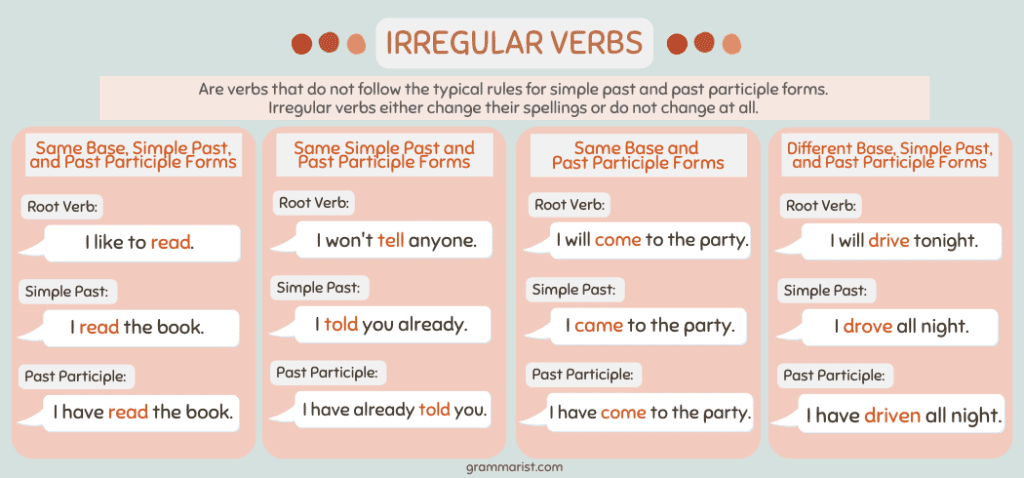Unlike regular verbs, irregular verbs require memorization because their simple past tense and past participle form do not follow the standard pattern. I know what you’re thinking, but it’s not too hard to remember, especially with my quick tips!
Keep reading as go over the definition and types of irregular verbs in English. I’ve even got examples and how to use them in sentences.
What is an Irregular Verb?

Irregular verbs in English are verbs that do not follow the typical rules for simple past and past participle forms.
The usual pattern is to add -ed to the base form of the verb for the past and past participle forms. However, irregular verbs either change their spellings or do not change at all.
For example, the verb fight does not have fighted as a simple past and past participle form. Instead, the correct word is fought. Make sense? Basically, it’s when you have to actually change the spelling of the verb for it to work.
The irregular verb form does not follow a specific formula, so every English speaker should master them.
Its opposite is the regular verb. Regular verbs refer to verbs that follow the typical pattern for simple past tense and past participle form. One example is the word dance. Its simple past and past participle form is danced.
What are the 4 Types of Irregular Verbs?
The four types of irregular verbs are based on the similarities and differences of their simple past and past participle forms.
Same Base, Simple Past, and Past Participle Forms/Irregular Verbs That Don’t Change
Some verbs with irregular forms have the same spellings for their base, past, and past participle forms. Here, I made some examples for you.
| Root verb | Simple Past | Past Participle |
| Hurt | Hurt | Hurt |
| Read | Read (different pronunciation) | Read (different pronunciation) |
| Let | Let | Let |
| Put | Put | Put |
| Cut | Cut | Cut |
| Cost | Cost | Cost |
| Burst | Burst | Burst |
| Hit | Hit | Hit |
| Shut | Shut | Shut |
Note that It’s unnecessary to look at the present and future verb tenses when determining an irregular verb.
Same Simple Past and Past Participle Forms
Some irregular verbs have a different base form but the same simple past and past participle form.
| Root verb | Simple Past | Past Participle |
| Find | Found | Found |
| Tell | Told | Told |
| Feel | Felt | Felt |
| Buy | Bought | Bought |
| Bring | Brought | Brought |
| Build | Built | Built |
| Keep | Kept | Kept |
| Teach | Taught | Taught |
| Think | Thought | Thought |
| Win | Won | Won |
| Send | Sent | Sent |
| Sleep | Slept | Slept |
Same Base and Past Participle Forms
Another type of irregular verb is verbs with the same base and past participle forms but different past forms. I think this one gets a bit confusing, so pay close attention to the examples.
| Root verb | Simple Past | Past Participle |
| Run | Ran | Run |
| Become | Became | Become |
| Come | Came | Come |
Different Base, Simple Past, and Past Participle Forms
The most complex type of irregular verb is one with a different base form, simple past, and past participle. These words may require memorization, such as the irregular verbs be and do. Some verbs in this category also and in -en for their past participle.
| Root verb | Simple Past | Past Participle |
| Drive | Drove | Driven |
| Shake | Shook | Shaken |
| Sing | Sang | Sung |
| Rise | Rose | Risen |
| Eat | Ate | Eaten |
| Break | Broke | Broken |
| Begin | Began | Begun |
| Bite | Bit | Bitten |
| Choose | Chose | Chosen |
| Grow | Grew | Grown |
| Freeze | Froze | Frozen |
| Fly | Flew | Flown |
| Hide | Hid | Hidden |
| Give | Gave | Given |
| Lie | Lay | Lain |
| Ride | Rode | Ridden |
| Throw | Threw | Thrown |
| Write | Wrote | Written |
| Be | Was/were | Been |
| Do | Did | Done |
The Most Common Irregular Verbs in English
Here are some of the most common verbs I could think of with irregular forms. You’ll find a mix of action, stative, and linking verbs in this list.
| Root verb | Simple Past | Past Participle |
| Be | Was/Were | Been |
| Do | Did | Done |
| Have | Had | Had |
| Make | Made | Made |
| Come | Came | Come |
| Say | Said | Said |
| Get | Got | Got/Gotten (Got for British English, Gotten for American English) |
| Go | Went | Gone |
| See | Saw | Seen |
| Know | Knew | Known |
| Take | Took | Taken |
| Think | Thought | Thought |
Strong Verbs and Weak Verbs
Remember that irregular and regular verbs are different from strong and weak verbs.
Strong verbs are verbs that change their vowels in the past tense. For example, sing becomes sang for the past tense.
Meanwhile, weak verbs are verbs that retain their vowels in the past tense. For example, land keeps the letter a in its past form, landed.
We can say that every strong verb is an irregular verb. But only a few weak verbs are irregular. One example of a weak, irregular verb is sleep. Its past tense is slept, keeping the letter e as its central vowel.
Irregular verbs with the same base forms and simple past tense are also weak. Some examples include spread, bet, hurt, and put.
Is Was an Irregular Verb?
Yes, was is an irregular verb because it has special verb forms. This linking verb in the past tense has be as the root verb and been as the past participle.
How Many Irregular Verbs are There in English?
There are around 200 irregular verbs in the English language. Wowza, right?
Irregular Verbs in Sentences

Below are some examples of irregular verbs in a sentence.
- I understood the discussion about irregular verbs. (simple past)
I have understood the discussion about irregular verbs. (past participle).
- I ran quickly to catch my flight. (simple past)
I have run 3 kilometers to get here. (past participle)
- I saw the eclipse yesterday. (simple past)
I have seen the new movie. (past participle)
- I was happy last month. (simple past)
I have been happy since last month. (past participle)
- I drank some wine last night with friends. (simple past)
I had already drunk wine when Jenna came. (past participle)
- I want to build a new house with you. (base form)
We built this house in 1997. (simple past)
I have built this house with all the money I have. (past participle)
Final Word on Irregular Verbs
The English language is composed of many verbs, such as modal verbs, copular verbs, imperative verbs, and irregular verbs. I hope my guide helped you understand the meaning and examples of irregular verbs.
You can identify irregular verb forms through past participle and simple past tense verbs. Remember that their verb conjugation does not follow the usual “-ed” pattern.
